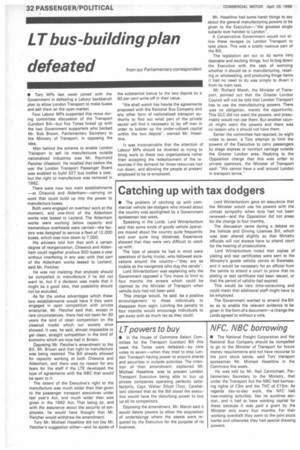LT bus-building plan
Page 34

If you've noticed an error in this article please click here to report it so we can fix it.
defeated from our Parliamentary correspondent
• Tory MPs last week joined with the Government in defeating a Labour backbench plan to allow London Transport to make buses and sell them on the open market.
Four Labour MPs supported this move during committee discussion of the Transport (London) Bill—but five Tories linked up with the two Government supporters who backed Mr. Bob Brown, Parliamentary Secretary to the Ministry of Transport, in opposing the idea.
Man behind the scheme to enable London Transport to sell its manufactures outside nationalized industries was Mr, Raymond Fletcher (Ilkeston). He recalled that before the war the London Transport Passenger Board was enabled to build 527 bus bodies a year, but the right to manufacture was removed in 1962.
There were now two main establishments —at Chiswick and Aldenham—carrying on work that could build up into the power to manufacture buses.
Both were engaged on overhaul work at the moment, and one-third of the Aldenham works was leased to Leyland. The Aldenham works were working below capacity and tremendous overheads were carried—the factory was designed to service a fleet of 12,000 buses, which was now down to 7,000.
His advisers told him that with a certain degree of reorganization, Chiswick and Aldenham could together produce 500 buses a year without interfering in any way with that part of the Aldenham works leased to Leyland, said Mr. Fletcher.
He was not insisting that anybody should be compelled to manufacture if he did not want to, but if a decision was made that it might be a good idea, that possibility should not be excluded.
As for the undue advantages which these two establishments would have if they were engaged in open competition with private enterprise, Mr. Fletcher said that, except in rare circumstances, there had not been for 50 years the kind of clean competition on the classical model which our society once showed. It was, he said, almost impossible to get clean, straight competition in the kind of economy which we now had in Britain.
Opposing Mr. Fletcher's amendment to the Bill, Mr. Brown said that right to manufacture was being restored. The Bill already allowed for capacity working at both Chiswick and Aldenham, and there was no reason for any fears for the staff if the LIE developed the type of agreements with the NBC that would be open to it.
The extent of the Executive's right to the manufacture was much wider than that given to the passenger transport executives under last year's Act, and much wider than was given in the 1962 Act. That being so, and with the assurance about the security of employees, he would have thought that Mr. Fletcher would withdraw his amendment.
Tory Mr. Michael Heseltine did not like Mr. Fletcher's suggestion either—and he spoke of the substantial bonus to the two depots by a 90 per cent write-off in their value.
"We shall watch like hawks the agreements proposed with the National Bus Company and any other form of nationalized transport authority to find out what part of the private sector will find it necessary to lay off men in order to bolster up the under-utilized capital within the two depots-, warned Mr. Heseltine.
It was inconceivable that the attention of Labour MPs should be diverted to trying to bring work to these two organizations rather than accepting the redeployment of the re sources if the demand for those resouices had run down, and allowing the people at present employed to be re-employed. Mr. Heseltine had some harsh things to say about the general manufacturing powers to be given to the Executive—"the greatest single subsidy ever handed to London".
A Conservative Government would not allow these ravages by London Transport to take place. This was a totally noxious part of the Bill.
The legislation set out to do some very desirable and exciting things, but to bog down the Executive with the task of worrying whether it should be in manufacturing, retailing or wholesaling, and producing fringe items it had no need to do was simply to divert it from its main task.
Mr. Richard Marsh, the Minister of Transport, pointed out that the Greater London Council will not be told that London Transport has to use the manufacturing powers. There was no obligation, merely the opportunity. This GLC did not want the powers, and presumably would not use them. But another council might want the powers and there was no reason why it should not have them.
Earlier the committee had rejected, by eight votes to seven, a Tory attempt to limit the powers of the Executive to carry passengers by stage express or contract carriage outside the Greater London area. Replying to the Opposition charge that this was unfair to private operators, the Minister of Transport said: 'We cannot have a wall around London in transport terms.
























































































































